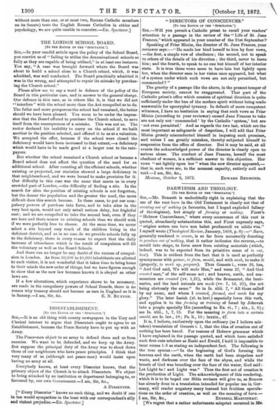THE LONDON SCHOOL BOARD.
[To THE EDITOR OF THE "SPECTATOR."]
your candid article upon the policy of the School Board, you convict us of "failing to utilise the denominational schools as fully as they are capable of being utilised," in at least one instance. You say, "A case was brought forward where the Board was about to build a school close to a Church school, which, it was admitted, was well conducted. The Board practically admitted it was in the wrong, and attempted to repair its mistake by purchas- ing the Church school."
Please allow me to say a word in defence of the policy of the Board in this particular case, and in answer to the general charge. Our defence in this case, as in others like it, is that we did not 'interfere" with the school more than the Act compelled us to do. The fuller and more prosperous the school had remained, the better should we have been pleased. You seem to be under the impres- sion that the Board offered to purchase the Church school, to save itself from the consequences of a mistake. This was not so. The rector declared his inability to carry on the school if we built another in the position selected, and offered it to us at a valuation. We accepted the offer, because if the school were closed the deficiency would have been increased to that extent,—a deficiency which would have to be made good at a larger cost to the rate- payers.
But whether the school remained a Church school or became a Board school does not affect the question of the need for an additional school. After counting all the efficient schools, whether existing or projected, our statistics showed a large deficiency in that neighbourhood, and we were bound to make provision for it. Our difficulty in this case was the same that meets us in every crowded part of London,—the difficulty of finding a site. In the search for sites the position of existing schools is not forgotten, but the denser the population and the greater the need, the more difficult does this search become. In these cases, to put our com- pulsory powers of purchase into force, and to take sites in the very best spots, would not only entail serious delay, but frightful coat; and we are compelled to take the second best, even if they are here and there nearer to existing schools than we should wish if we were perfectly free to choose. At the same time, we never select a site beyond easy reach of the children living in the deficient district, and as in no case do we provide schools fully up to the deficiency, there is every reason to expect that the daily increase of attendance which is the result of compulsion will fill the voluntary as well as the Board Schools.
And there can no longer be any doubt of the success of compul- sion in London. As from 30,000 to 40,000 inhabitants are allotted to each visitor, it is not wonderful that it takes time to bring home to their minds the new order of things, but we have figures enough to show that as the new law becomes known it is obeyed as other laws are.
If a few alterations, which experience shows to be necessary, are made in the compulsory powers of School Boards, there is no reason why truancy should not become as rare in England as it is


































 Previous page
Previous page